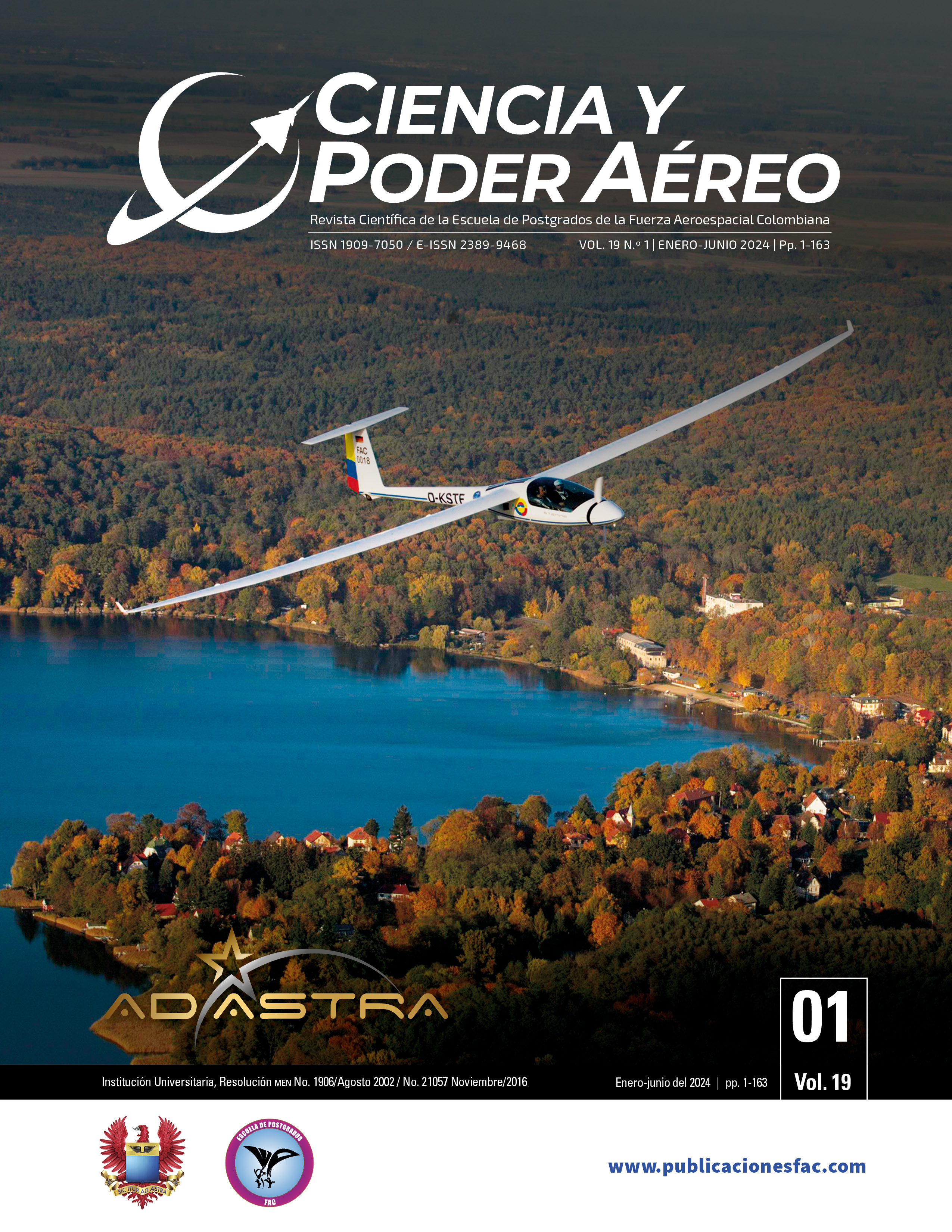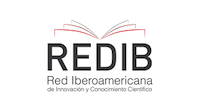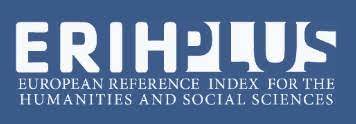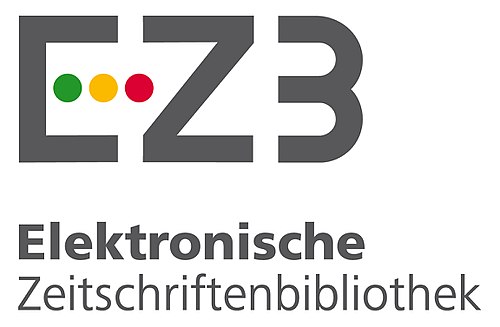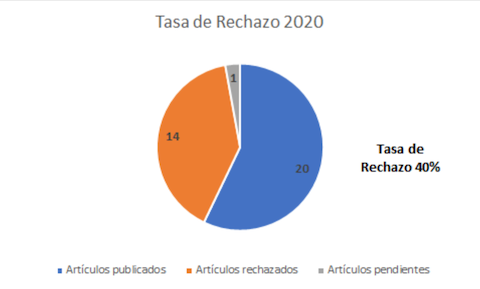Cybersecurity guidelines in high education institutions of the Colombian Aerospace Force
DOI:
https://doi.org/10.18667/cienciaypoderaereo.803Keywords:
Cybersecurity, education, cybercrime, cybersecurity risks, cybersecurity threats, information technologyAbstract
This reflection article is based on research that focused on the development of a proposal that could strengthen responsibility in cybersecurity from an institutional perspective, specifically in the Military Gymnasium of the Colombian Aerospace Force (gimfa), taking into account the guidelines strategies as support tools and complements to the educational model, fulfilling the objective of identifying and analyzing the categories that are associated with risks and threats in the educational community, which turned out to be determining factors in the training and awareness of cybersecurity in spaces like educational.
Downloads
References
Albert, M. J. (2008). La investigación educativa: claves teóricas. Revista Investigaciones en Educación, 8(1), pp. 207-219.
Banco Bilbao Vizcaya Argentaria - BBVA. (2017). La importancia de las TIC en las necesidades de la sociedad: una aproximación a través de la óptica de Maslow. Pp. 1 – 16 [Archivo PDF]. https://www.bbvaresearch.com/wp-content/uploads/2017/09/maslow_piramide.pdf
Caamaño, E. & Gil, R. (2020). Cybersecurity risk prevention from forensic auditing: combining organizational human talent. NOVUM, revista de Ciencias Sociales Aplicadas, 1(10), pp. 61 – 80. https://www.redalyc.org/journal/5713/571361695004/html/
Cano, J. J. & Rocha, A. (2019). Ciberseguridad y ciberdefensa: Retos y perspectivas en un mundo digital. RISTI, (32). DOI: 10.17013/risti.32.0.
Castilla, M. F. (2013). La teoría del desarrollo cognitivo de Piaget aplicada en la clase de primaria. [Archivo PDF]. https://uvadoc.uva.es/bitstream/handle/10324/5844/TFG B.531.pdf;jsessionid=3DE54FF07F73E8720E2F8E86068BE10D?sequence=1
Cayón, J. G. (2014). La importancia del componente educativo en toda estrategia de Ciberseguridad. Centro de Estudios Estratégicos Sobre Seguridad y Defensa Nacionales. ESDEGUE Revista científica, 9(18). https://esdeguerevistacientifica.edu.co/index.php/estudios/article/view/9/4
Cuadernos de Estrategia 149. (2010). Ciberseguridad, retos y amenazas a la seguridad nacional en el ciberespacio. Ministerio de Defensa, (149). [Archivo PDF]. https://www.ieee.es/Galerias/fichero/cuadernos/CE_149_Ciberseguridad.pdf
Davis, F. (1989). Perceived usefulness, perceived ease of use and user acceptance of information technology. MIS Quarterly, 13(3), pp. 319-340.
D.Q. Institute. (2019). DQ Global Standards Report 2019. [Archivo PDF]. https://www.dqinstitute.org/wp-content/uploads/2019/11/DQGlobalStandardsReport2019.pdf
Echeverría, J. (2018). La revolución tecnocientífica. [Archivo PDF]. http://naturalezacienciaysociedad.org/wp-content/uploads/sites/3/2018/01/Echeverria-Revoluci%C3%B3nTecnocient%C3%ADfica.pdf
Fernández, K; Casarín, A. & McAnally, L. (2015). Apropiación Tecnológica: Una visión desde los modelos y las teorías que la explican. Perspectiva Educacional, Formación de Profesores, 54(2), pp. 109- 125. https://www.redalyc.org/pdf/3333/333339872008.pdf
Fondo de las Naciones Unidas para la Infancia – UNICEF. (2019). Niños, niñas y adolescentes en línea. Riesgos de las redes y herramientas para protegerse. http://www.codajic.org/node/4215
Galán, C. M., & Galán Cordero, C. (2016). La ciberseguridad pública como garantía del ejercicio de derechos. Derecho & Sociedad, (47), pp. 293-306. https://revistas.pucp.edu.pe/index.php/derechoysociedad/article/view/18892
ICONTEC. (2019). Norma ISO IEC-ISO 31010: el uso de técnicas para la evaluación del riesgo. [Archivo PDF]. https://campus.icontecvirtual.edu.co/uploads/posts/Z95h9fsvPvDsUZNjwKxr.pdf
Marin, J., Nieto, Y., Huertas, F. & Montenegro, C. (2019). Modelo Ontológico de los Ciberdelitos: Caso de estudio Colombia. RISTI, (17), pp. 244-257. https://www.proquest.com/openview/ef48269d2b309b4657581d7bc7b8172a/1?pq-origsite=gscholar&cbl=1006393#:~:text=Al%20realizar%20el%20modelo%20ontol%C3%B3gico,realiza%20la%20conducta%20y%20su
McClelland, D. (1964). The Achieving Society. JSTOR. 3(3) (1964), pp. 371-381 https://doi.org/10.2307/2504238.
Monsalve, J. (2018). Ciberseguridad: principales amenazas en Colombia (Ingeniería Social, Phishing y Dos). Universidad Piloto de Colombia. DOI: http://repository.unipiloto.edu.co/handle/20.500.12277/4663
Morales, J. A. (2019). Ciberseguridad y su aplicación en las Instituciones de Educación Superior. Escuela Superior Politécnica Agropecuaria de Manabí Manuel Félix López, pp. 438– 448.
Oliver, E. & Santos, T. (2014). Socialización preventiva ante el Ciberacoso. C&SC – Communication & Social Change, 2(1), pp. 87-106. doi:10.4471/csc.2014.09.
Ospina, M. & Sanabria, P. (2020). Desafíos nacionales frente a la ciberseguridad en el escenario global: un análisis para Colombia. Revista Criminalidad Rev. Crim. 62(2). http://www.scielo.org.co/scielo.php?script=sci_arttext&pid=S1794-31082020000200199
Otzen T. & Manterola C. (2017). Técnicas de muestreo en una población sobre una población de estudio. Int. J. Morphol., 35(1), pp. 227-232. http://dx.doi.org/10.4067/S0717-95022017000100037
Passos, E. (2015). Metodología de la presentación de trabajos de investigación. “Una manera práctica de aprender a investigar, investigando”. Ed. Institución Tecnológica Colegio Mayor de Bolívar, pp. 1- 120.
Reyes, L. (2007). La teoría de la acción razonada: implicaciones para el estudio de las actitudes. Investigación Educativa Duranguense. (7), pp. 66 -77. https://www.researchgate.net/publication/28175060_La_Teoria_de_la_Accion_Razonada_Implicaciones_para_el_estudio_de_las_actitudes
Secretaria de Senado. (2009). LEY 1273 DE 2009. Ley de protección de datos. http://www.secretariasenado.gov.co/senado/basedoc/ley_1273_2009.html
Sneiderman, S. (2006). Las Técnicas Proyectivas Como método De investigación Y Diagnostico. actualización En Técnicas Verbales: “El Cuestionario Desiderativo”. Subjetividad y Procesos Cognitivos, (8), pp. 296-331. https://www.redalyc.org/pdf/3396/339630247014.pdf
Valencia, A. Bermeo, M., Acevedo, Y., Garcés, L., Quiroz, J., Benjumea, M. & Vanegas, J. (2020). Tendencias investigativas en educación en ciberseguridad: un estudio bibliométrico. RISTI, (29), pp. 225-239.
Valle, M. (2018). Ciberseguridad. Consejos para tener vidas digitales más seguras. Educatio Siglo XXI, 36(3), pp. 519-522. [Archivo PDF].
Downloads
Published
Issue
Section
License
Copyright (c) 2023 Escuela de Postgrados de la Fuerza Aérea Colombiana

This work is licensed under a Creative Commons Attribution 4.0 International License.
Assignment of Copyrights
Authors assign Ciencia y Poder Aéreo journal the exclusive rights (reproduction, distribution, public communication, and transformation) to exploit and commercialize their work, in whole or in part, in all the formats and modalities of present or future exploitation, in all languages, throughout the life of the work and throughout the world.
All contents published in Ciencia y Poder Aéreo journal are licensed under a Creative Commons Attribution 4.0 International License, whose complete information is available at http://creativecommons.org/licenses/by/4.0/
Under the terms of this license, users are free to download, print, extract, archive, distribute and publicly communicate the content of articles, provided that proper credit is granted to authors and Ciencia y Poder Aéreo, scientific journal of the Graduate School of the Colombian Air Force. Except when otherwise indicated, this site and its contents are licensed under a Creative Commons Attribution 4.0 International License.
For other uses not considered under this license it is required to contact the Director or the Editor of the journal at the e-mail address cienciaypoderaereo1@gmail.com.
The Graduate School of the Colombian Air Force and this publication are not responsible for the concepts expressed in the articles, including the metadata or the affiliation stated by authors. This is the full responsibility of the authors.


